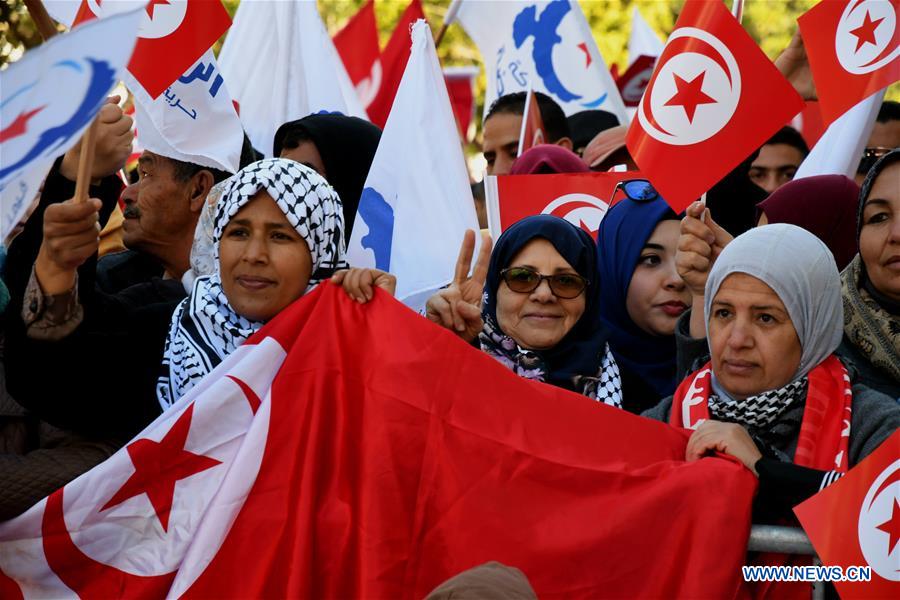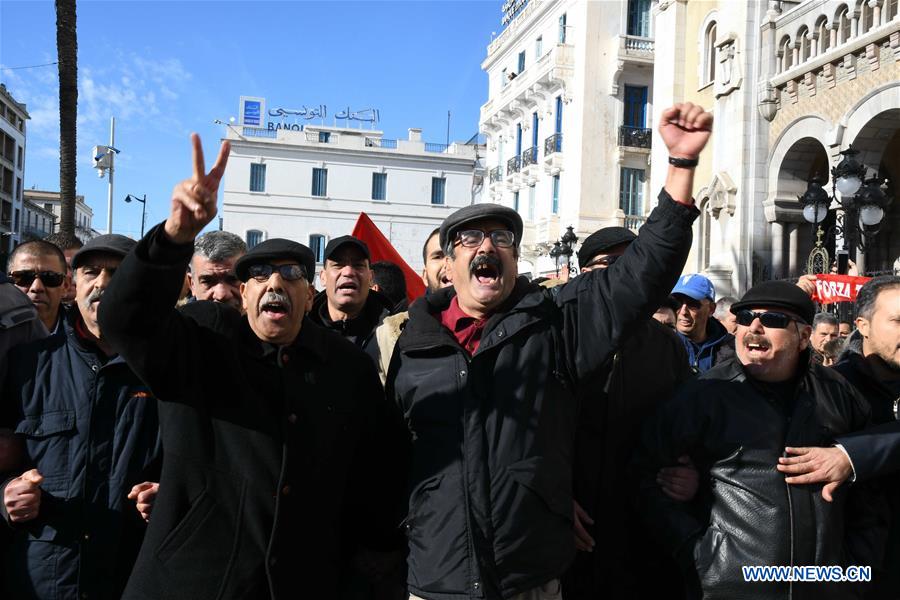Tunisia marks 7th anniversary of popular uprisings toppling ex-president
 0 Comment(s)
0 Comment(s) Print
Print E-mail Xinhua, January 15, 2018
E-mail Xinhua, January 15, 2018

Tunisians commemorate Sunday the 7th anniversary of the popular uprisings which resulted in toppling former President Zine al Abidine Ben Ali on January 14, 2011.
Different from previous anniversaries, Tunisians have complex feelings this year, a mixture of festive emotions and regrets following wave of violence and protests throughout the country.
Thousands of People gathered for a peaceful march on Avenue Habib Bourguiba in downtown Tunis, where the most significant protest of the revolution took place on January 14, 2011.
Tunisia, the economy of which is dependent on tourism, had been ruled for 23 years by former President Zine El Abidine Ben Ali, who was ousted in January 2011 after massive and peaceful popular protests.
Since then, the country has been struggling in an economic crisis.
In the peaceful march, Zied Lakhdhar, a high member of the Popular Front, an opposition party, told Xinhua "seven years after the revolution, no real progress has been detected."
"We risk returning to the starting point with a government who still unable to find solutions to regional disparity, marginalization and inequality of development opportunities. The unemployment in our country has been over 15 percent, especially among higher-education graduates."
Lakhdhar also pointed out "the recent peaceful protests against the new finance law, have coincided with some attempts to make the country in chaos and anarchy."
Over 800 people have been arrested since Monday in Tunisia after clashes between protesters and security forces over price hikes which caused by the new finance law.
They were arrested over charges of looting, ransacking, blocking roads and vandalism.
Tunisian President Beji Caid Essebsi Saturday convened representatives of political parties, trade union and the employers association to discuss ways to overcome the current problems and stressed people's livelihood issues should be emphasized.
Essebsi also accused some foreign media "exaggerating" Tunisia's social unrest, and undermining Tunisia's international image.
Haythem Jmai, an opposition activist, said most people are against certain articles in the new finance law, which will only aggravate budget deficit, but undermine people's purchasing power and especially feed a whole platform of corruption.
"Seven years since the revolution, we suffer seven years of despair," Ahmed Ltaief, a college student of Literature, said during the peaceful march.
"The inability of current officials left free path to corruption, slowing down and suffocating our country's economy," he added.
"At present, Tunisian national decision depends on International Monetary Fund (IMF), which encourages recruitment reduction and even the acceleration of retirement anticipated for certain sectors in public service," said Ahmed.
Lakhdhar said that "under the pretext of recovering financial and economic balances of the country, the government tries to offer false tranquilizers, detriment to the interests of Tunisian people, especially the poorest class."

Despite the complain, Haythem Jmai said that January 14, 2011 represented a pivotal date in the history of Tunisia after 23 years of dictatorship and repression.
Rafik Abdessalem, the former Tunisian Minister of Foreign Affairs, told Xinhua in an interview that "we should admit there do exist certain benefits of the revolution. Tunisians have done well half of the process with certain political stability."
Rafik listed the main priorities of the current government for the year 2018, include promoting foreign investment, improving living conditions of citizens, as well as creating employment opportunities aimed at young people.
"But the destruction of public and private goods as well as acts of looting and violence recorded recently can never favor economic revival or resolve the country's socio-economic problems," Rafik insisted.
Earlier in the morning on Sunday, Tunisian President Beji Caid Essebsi highlighted people's rights of development, especially of young people, on an inauguration of a youth center in the north-west suburbs of capital Tunis.
Essebsi said in his speech that "young people have the right to say nothing has changed because there is no job," adding that his country currently has about 620,000 unemployed which including 250,000 graduates of higher education.
"Their wait was longer and longer. This year will be dedicated to our young people," concluded Essebsi.






Go to Forum >>0 Comment(s)